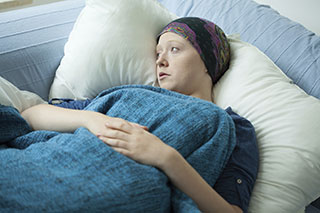Helping professionals (eg, nurse, social worker, physician), especially those in the oncology field, are burdened with difficult tasks on a constant basis. For oncology nurses especially, daily tasks can consist of meeting with patients for follow-up appointments, administering chemotherapy and other medications, or even being a liaison between the patient and the oncology physician. Oncology nurses are rightfully praised for all the work they do, but the emotional toll caring for their patients takes on their own mental health is often overlooked.
Vicarious trauma — also known as compassion fatigue or burnout — is a common effect of the consistent care that helping professionals provide. In fact, a 2021 Washington University in St. Louis study found that 40% to 85% of helping professionals expressed some form of vicarious trauma.1 When helping professionals are repeatedly faced with traumatic experiences, these experiences, in turn, can have a negative effect on the body, leading to common burnout symptoms such as fatigue, irritability, and lack of motivation.
What Is Vicarious Trauma?
Many assume that traumatic experiences encompass gruesome or violent imagery, but there are many situations that can lead to trauma for patients, and in turn, vicarious trauma for the medical professionals caring for them. Listening to a patient talk about their cancer diagnosis can be just as, if not more, traumatic for a helping professional as it is for the patient. And, no matter the role of an oncology professional, exposure to the effects of a cancer diagnosis is constant.
Therefore, these experiences may be considered a normal part of their day, but this does not equate to immunity. The emotional stress caused by a particular event is sometimes evident, but when these events occur frequently, one does not actively feel how it affects their own health.
What Are Its Causes?
There are many ways that an oncology medical professional can experience vicarious trauma. Medical professionals often develop close relationships with their patients, some of whom will unfortunately receive poor prognoses.
Nurses have to inject medication or administer intravenous chemotherapy to patients, which can be painful processes for the patient, on a daily basis.
Medical professionals provide a safe environment for patients to truly express how they are coping with their diagnosis, which may lead to a discussion about painful side effects, severe changes in physical appearance, or other ways the diagnosis has negatively affected the patient.
These are just a few examples of what an oncology medical professional may experience on a consistent basis. Regular exposure to any of these situations can take a toll on one’s mental health. In addition, providing a safe space for someone directly experiencing trauma can itself be exhausting.2
Some researchers believe that vicarious trauma is based on the Constructivist Self Development Theory, in that trauma disrupts basic human development and the constant strive for safety and control. Others note a chemical imbalance at play, where the brain constantly emits a fear response leading to the release of cortisol and adrenaline.2
No matter the belief of why or how vicarious trauma occurs, everyone can understand that encountering the effects of a cancer diagnosis and constantly providing support to those coping with one can be both mentally and physically draining. Signs of mental and physical exhaustion include lack of motivation, forgetfulness, a weakened immune system, depressive and anxious emotions, increased heart rate, difficulty breathing, impaired thought processes, lack of patience, and so much more.3 While these symptoms are commonly referred to as burnout, vicarious trauma manifests in helping professionals as a tendency to normalize them.
Preventive Measures
Vicarious trauma is becoming better understood, and so are the ways in which to combat its effects. Consistent self-care and external support are both key to alleviating the negative symptoms.4 This includes but is not limited to meditation; prayer; setting aside time for pleasurable hobbies, friends, and family; establishing healthy boundaries between work and life; learning to say no to others; practicing kindness and patience with oneself; and most importantly, asking for help.
A healthy outlet, such as a therapist or support group, can help alleviate feelings of isolation and hopelessness. Your insurance company or searching organizations such as the National Alliance on Mental Illness (NAMI) and Psychology Today can connect you to mental health care local to your area. Your human resources department can help you explore what free supportive services are available both within and outside your organization.
Finally, vicarious trauma is becoming more readily recognized in the workplace. Supervisors should check in with their direct reports frequently to foster a healthy work environment. These check-ins should be a regular occurrence as a preventive measure, rather than only treating the trauma symptoms on an individual, as-need basis.
Nurses should talk to their supervisor if they are feeling any symptoms of burnout, even if noticeable symptoms are experienced only once. Early action can lead to early prevention that will keep you organized, healthy, and happy, and in the workforce.5
Dina Smith is the caregiver program coordinator at CancerCare.
Reference
- Gun Violence Initiative. Professional helpers can experience vicarious trauma Institute for Public Health; Washington University in Saint Louis website. Published online October 29, 2021. Accessed May 23, 2023. https://publichealth.wustl.edu/professional-helpers-can-experience-vicarious-trauma/
- Quitangon G. Vicarious trauma in clinicians: fostering resilience and preventing burnout. Psychiatric Times. 2019;36(7):18.
- Merino D. Vicarious trauma impacts those in ‘helping’ professions [Issues]. The Guardian. Published online May 26, 2022. Accessed on May 23, 2023. https://guardian.ng/issue/vicarious-trauma-impacts-those-in-helping-professions-2/
- Hanley M, ed. Advice for caregivers: handling burnout. CancerCare website. Updated October 4, 2022. Accessed May 23, 2023. https://www.cancercare.org/publications/407-advice_for_caregivers_handling_burnout
- Breen L, Hewitt Y, O’Connor M, Lobb E. The “specter” of cancer: exploring secondary trauma for health professionals providing cancer support and counseling. Psychol Serv. 2014:11(1):60-67. doi:10.1037/a0034451
